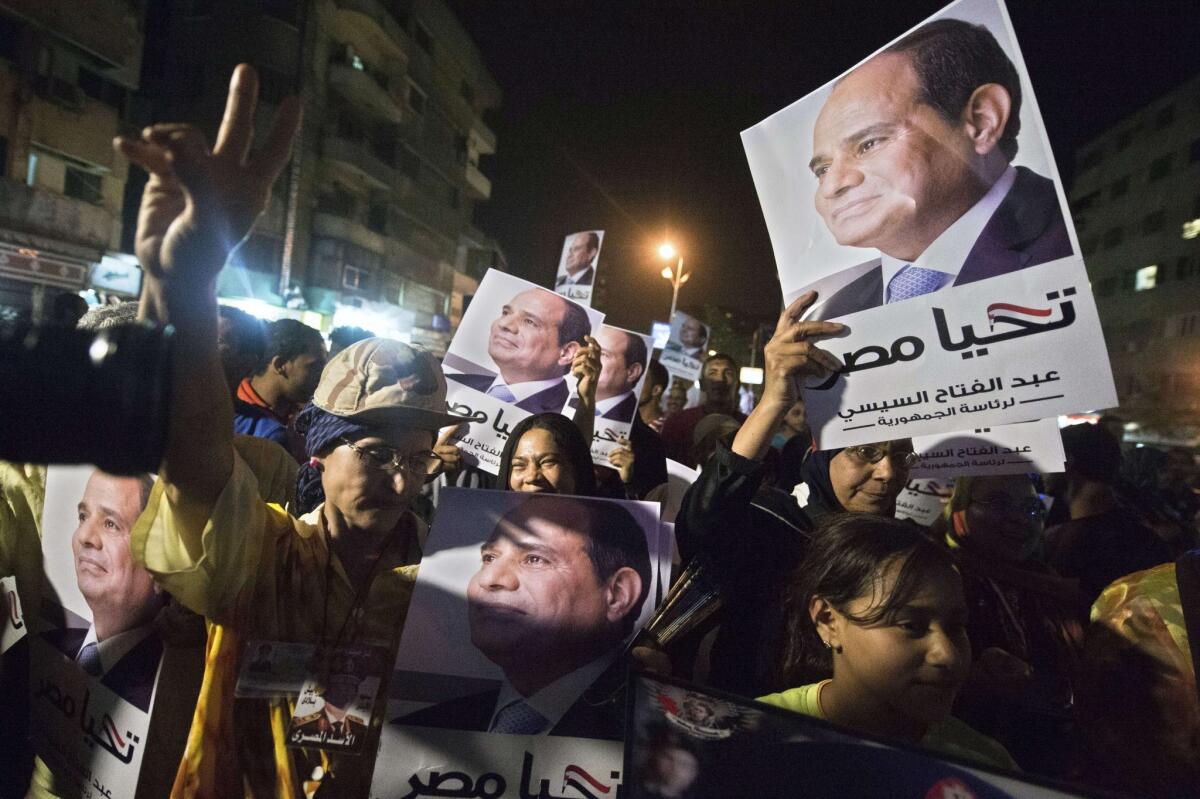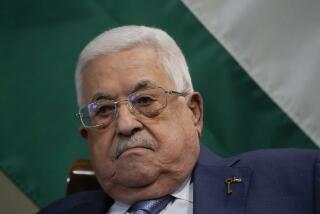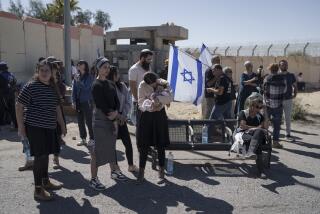Egyptian presidential candidate Sisi: Muslim Brotherhood ‘finished’

The Muslim Brotherhood can look for no handouts from Abdel Fattah Sisi, the man expected to be Egypt’s next president. Nor, apparently, can secular opponents of the government.
In the first televised question-and-answer session of his campaign, which aired Monday night with another segment to follow on Tuesday evening, the former army field marshal took questions from generally friendly and non-confrontational interviewers from two Egyptian broadcasters.
Sisi, the former defense minister who has been Egypt’s de facto leader for the last 10 months, said it would not be possible for the Brotherhood, once Egypt’s largest political movement, to reenter political life. The group has been formally branded a terrorist organization, and thousands of its followers are in jail. More than 1,000 of them have been killed in clashes with security forces.
The retired military man, who wore a suit and light-blue tie for his TV appearance, declared that the ouster of Islamist president Mohamed Morsi in July was not at the military’s behest, but that of the Egyptian people. Sisi said the subsequent sweeping crackdown against Morsi’s movement marked the implementation of a popular mandate.
“It’s not me who finished the Muslim Brotherhood -- the Egyptian people have,” he said, adding that other militant groups that have emerged in recent months were merely “camouflage” for the Brotherhood. The movement has publicly renounced violence, but the government blames it for a wave of violent attacks.
Sisi’s forceful rejection of any public role for the Islamist group seemingly flies in the face of calls for political inclusiveness from the Obama administration and other Western governments. It also appeared to set the stage for a long-term confrontation with adherents of the Brotherhood, the region’s oldest Islamist group and one that has deep roots in Egypt.
Over many decades, successive Egyptian leaders sought to contain and curb the movement, but never entirely succeeded.
The highly orchestrated interview appeared to set the stage for the remaining three weeks of the campaign before the presidential vote. Rather than a live question-and-answer session with possibly unpredictable results, Sisi sat for the tightly scripted interview on Sunday, and it was carefully vetted by his campaign before its release over two days.
Sisi shot to immense popularity after the coup against Morsi, and he is still heavily favored to win the election, although some cracks have emerged in his support. The Brotherhood is boycotting the vote, and young people also largely stayed away from the polls in a constitutional referendum in January.
But many Egyptians equate a series of repressive measures by the interim government as guarantors of security -- despite a sharp rise in violence under the military-backed administration. The last 10 months have been punctuated by bombings, and the army is battling an active Islamist insurgency in the Sinai Peninsula.
In the interview, the 59-year-old Sisi also expressed support for Egypt’s harsh and much-criticized protest law, which effectively criminalizes spontaneous street demonstrations. It has been used as a tool not only against backers of the Brotherhood, but secular opponents as well. Sisi said the protest law, enacted last November, was a means of countering “chaos.”
“This law is to regulate protests and not ban them,” he said. “I’m talking about a country. People have to understand this and support us on this, and anyone believing otherwise wants to sabotage Egypt.”
Sisi’s sole competitor in the presidential race, Hamdeen Sabahi, had previously announced that he would abolish the protest law and pardon all those imprisoned under the law if he wins the election. The vote is set for May 26-27.
Hassan is a special correspondent.
More to Read
Start your day right
Sign up for Essential California for news, features and recommendations from the L.A. Times and beyond in your inbox six days a week.
You may occasionally receive promotional content from the Los Angeles Times.






